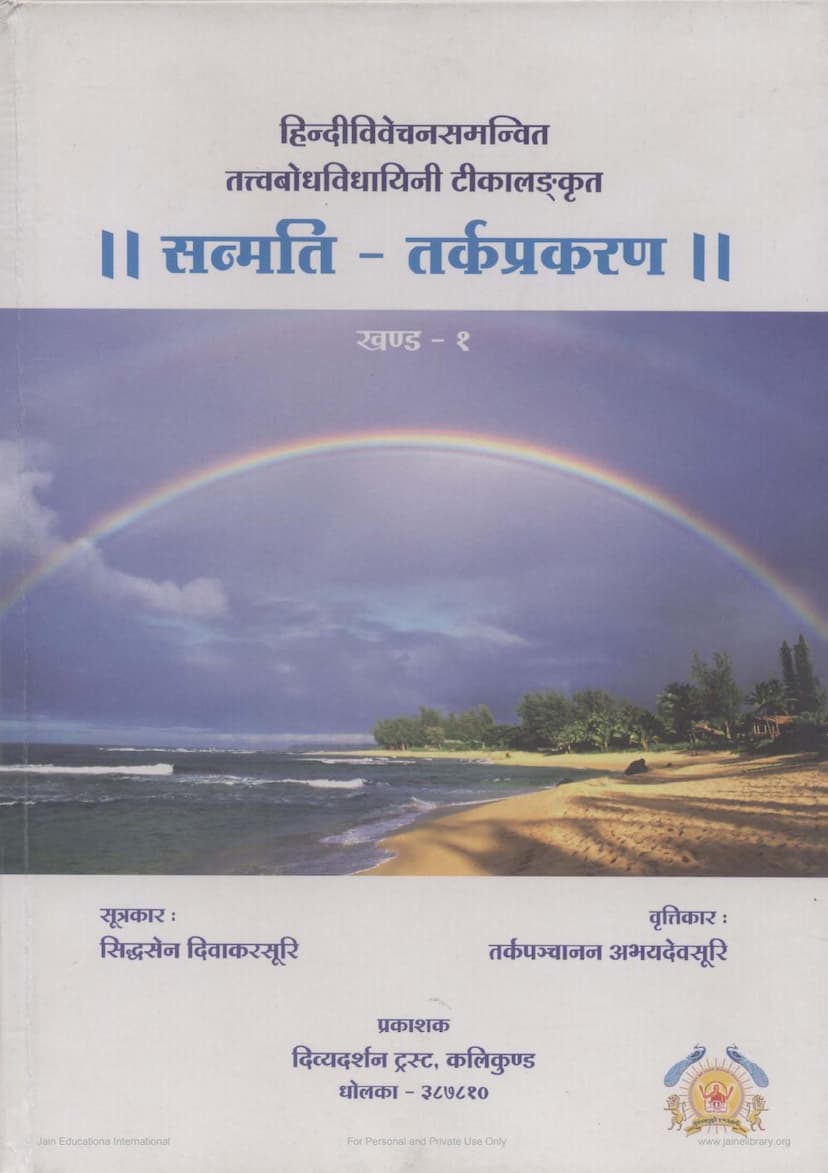Sanmati Tark Prakaran Part 01
Added to library: September 2, 2025

Summary
Summary of Sanmati Tark Prakaran Part 01 by Abhaydevsuri
This comprehensive Jain text, "Sanmati Tark Prakaran Part 01," authored by Abhaydevsuri, is a detailed commentary on the original work "Sanmati Tark Prakaran" by Siddhasen Divakar Suri. The publisher is Divya Darshan Trust. This particular volume, the first part of the commentary, includes a Hindi explanation ("Hindi Vivechan") compiled by Jai Sundar Suri. The work is dedicated to the memory of Pujya Bhuvanbhanu Surishwarji Maharaja.
Core Subject Matter:
The text is a foundational work in Jain logic and philosophy, primarily focused on the doctrine of Anekantavada (the theory of manifold aspects or non-absolutism) and Nayavada (the theory of standpoints or partial truths). The "Sanmati Tark Prakaran" itself aims to refute one-sided philosophical views (ekantavada) and establish the superiority and comprehensiveness of the Jain perspective. Abhaydevsuri's commentary, "Tattva Bodha Vidhayini," elaborates on these complex logical arguments in Sanskrit. This Hindi version aims to make these profound discussions accessible to a wider audience.
Key Aspects and Themes:
- Refutation of Ekantavada: The text systematically analyzes and refutes various one-sided philosophical schools prevalent in ancient India, including those of the Buddhists, Vaisheshikas, Sankhyas, and Mimamsakas. It presents their arguments (purvapaksha) and then provides detailed counter-arguments (uttarapaksha) to establish the Jain viewpoint.
- Praise for Jainism and Anekantavada: The work extols the virtues of the Jain path (Siddha Sasan) and the doctrine of Anekantavada, highlighting its ability to encompass reality in its totality, avoiding the pitfalls of narrow, absolutist perspectives.
- Epistemology and Logic: A significant portion of the text delves into the nature of knowledge (pramana), its validity (svatah-pramana or paratah-pramana - self-validity vs. other-validity), the role of perception and inference, and the complexities of logical reasoning.
- Philosophical Debates: The commentary engages with intricate philosophical debates, such as the nature of reality, the existence of God, the soul, the afterlife, and the meaning of liberation (moksha).
- Importance of Dravyanuyoga: The introduction and preface emphasize the crucial role of Dravyanuyoga (the branch of Jain philosophy dealing with substances and their properties) in achieving spiritual realization. The "Sanmati Tark Prakaran" is considered essential for a complete understanding of this philosophical discipline.
- Accessibility through Hindi: The primary purpose of this publication is to present a profound Sanskrit work with a clear and accurate Hindi explanation, making the intricacies of Jain logic accessible to both scholars and general readers interested in Jain philosophy.
Structure and Content (Based on the Table of Contents and Introductions):
The first volume of this commentary covers extensive ground, as indicated by the detailed table of contents. The initial chapters focus on Pramanavada (theory of knowledge and valid cognition). This includes discussions on:
- The Nature of Pramana: Whether knowledge is self-valid or valid through other means.
- Arguments for and against Svatah Pramanyavada: Critiques of the Mimasaka and Buddhist views on self-validity of knowledge.
- The Role of Sensory Perception and Inference: Detailed analysis of how we acquire knowledge through our senses and reasoning.
- The Concept of 'Naya' (Standpoints): The text implicitly or explicitly discusses how different standpoints contribute to understanding reality, a core concept in Jainism.
- The Nature of the Soul (Atma): Discussions likely touch upon the soul's attributes, its relation to the body, and its journey.
- The Refutation of Various Philosophical Schools: As the book progresses, it systematically dismantles the arguments of opposing philosophical systems.
The provided text also gives insights into the editorial and publishing process, acknowledging contributors and expressing the hope that the work will benefit readers in their spiritual pursuit. The dedication to respected Acharyas and the mention of the Divya Darshan Trust highlight the tradition and lineage behind this valuable publication.
In essence, this book is a monumental effort to translate and explain a highly technical and philosophical Jain text, making its profound insights on logic, reality, and spiritual liberation available in Hindi. It serves as a vital resource for understanding the depth and rigor of Jain philosophical thought.